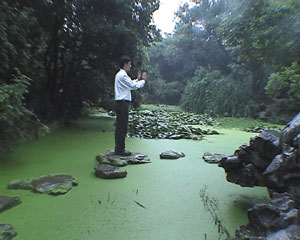Yang Fudong
dal 5/9/2003 al 18/10/2003
Segnalato da
5/9/2003
Yang Fudong
BuroFriedrich, Berlin
The young Chinese artist Yang Fudong presents two films at BuroFriedrich that address the ruptures in contemporary Chinese society

The young Chinese artist Yang Fudong presents two films at BuroFriedrich that address the ruptures in contemporary Chinese society. In his films protagonists in Western dress are shown in contrast to traditional role models; the narrow streets and close-set buildings of the old Chinese city are replaced by modern skyscrapers; the uniform dress of the Maoist era clashes with the outrageous fashion of the younger generation. Yang Fudong's films are characterized by
radical change, depicting the confrontation and combinement of estranged elements. He clearly demonstrates that the process of change leaves traces that alter one's attitudes to tradition. Moreover, Yang Fudong examines how classical stereotypes of China coexist with its newly aquired image.
In Liu Lan (14' b/w) 2003, a young man in a fashionable light suit with a briefcase returns to a lake, where a young woman in traditional dress sits on a boat and knits. Depsite their assumed relationship, they do not approach each other. While she is busy with fishing and handiwork, like in the text of the Chinese folk song we hear, he seems alien and from another era.
Another film, Honey (9') 2003, features a young woman dressed provocatively in net stockings, a mini skirt, and various fur coats along with different men who either drink tea, play cards or who are filmed entering and leaving a building. Similar to Luis Buñuel´s Film "That Obscure Object of Desire" a closer look at the woman creates a play of confusing appearances and perception. While Bunuel had two actresses play the same role, Yang Fudong creates moments of irritation by having the woman wear different fur coats in sequential scenes. The viewer is only told part of the story. It is only through the way the details of the scenes are narrated that one can gather what is actually happening between the woman and the men. Yang Fudong's narrative structure does not follow a linear sequence but is built around concentrated observations, which provide an intimate yet censored view of events through indeterminate jumps in time.
Yang Fudong, born in 1971 in Beijing, lives and works in Shanghai. His recent exhibitions include 50th Venice Biennale, 4th Shanghai Biennale (Shanghai), Alors la Chine? (Centre Pompidou, Paris), Documenta 11 (Kassel) 1st Valencia Biennale (Valecia), Living in Time (Hamburger Bahnhof, Berlin). In the fall he will take part in the exhibition Happiness: A Survival for Art and Life at the Mori Art Museum, Tokyo.
Opening: Saturday 6th September at 6pm
open end with films, food & drinks
Opening hours: Thuesday - Saturday 12 - 6pm
BuroFriedrich
Holzmarktstrasse 15 - 18
Berlin



